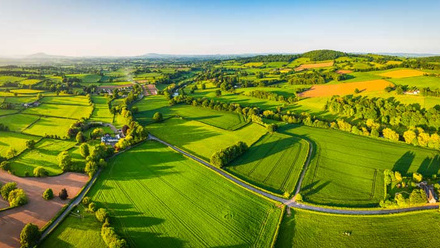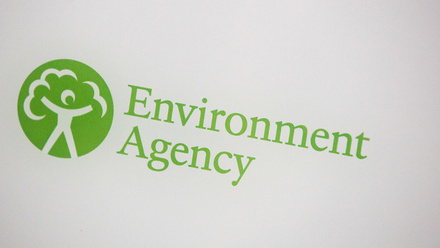Analysis: What the COP28 agreement means for Members and UK agriculture
After what seemed a frenzy of final activity, the United Nations Climate Change Conference of Parties (COP) 28 finally drew to a close only a day late on 13 December - something which didn’t seem likely after the tensions 48 hours earlier.
So what has been agreed at COP28 and what does it mean? AIC's Head of Sustainability Vicky Robinson takes a closer look.

"Compromise" is probably the best word used to describe the final agreement and, given negotiators from nearly 200 countries were involved and the breadth of their positions, it was ever going to be thus.
Two words have understandably had the most enormous impact in the final discussions, with the wording around them having initially been considerably watered down and later strengthened in the final text: "fossil fuels".
The wording around them may not be as strong as some wanted or had hoped but the references included would have been unthinkable even a few years ago, so progress has and is being made.
Fossil fuels focus
The exact wording is “transitioning away from fossil fuels in energy systems, in a just, orderly and equitable manner, accelerating action in this critical decade, so as to achieve net zero by 2050 in keeping with the science" which has been described as "the beginning of the end of the fossil fuel era" by the UN.
As always, the language used is key to the interpretation with “called upon” being used which for some puts this on the "nice to do" rather than "must do" list.
But the fact they are even being included in the text is a positive and their exclusion may have seen several countries walking away in the final negotiations.
Methane is also covered with "substantially" reducing non-CO2 emissions from the energy system, particularly methane added as a priority for the remainder of this decade.
Global stocktake
The overall decision was for a "global stocktake", a world first, to rapidly increase climate action before the end of the decade with the aim of keeping the target of global warming no more than 1.5°C by the year 2100 on the cards.
This stocktake is an umbrella term for all the elements being discussed, including the science behind the figures, actions including tripling of renewable energy capacity and doubling energy efficiency improvements by 2030, accelerating efforts towards the phase-down of unabated coal power, phasing out inefficient fossil fuel subsidies, and other measures that drive the transition away from fossil fuels in energy systems.
This means that countries will be urged to include these aspects within their next climate action plans, also known as nationally determined contributions.
Significant to agriculture is that emissions from agriculture and food systems will now be included in these plans following the declaration "COP28 UAE Declaration on Sustainable Agriculture, Resilient Food Systems and Climate Action" [PDF] signed on Friday 1 December.
Agriculture adaption
Agriculture is mentioned in the final agreement in the ‘Adaption’ Section with the following text:
55. Encourages the implementation of integrated, multi-sectoral solutions, such as land[1]use management, sustainable agriculture, resilient food systems, nature-based solutions and ecosystem-based approaches, and protecting, conserving and restoring nature and ecosystems, including forests, mountains and other terrestrial and marine and coastal ecosystems, which may offer economic, social and environmental benefits such as improved resilience and well-being, and that adaptation can contribute to mitigating impacts and losses, as part of a country-driven gender-responsive and participatory approach, building on the best available science as well as Indigenous Peoples’ knowledge and local knowledge systems;
Where and how the finance will work to achieve all of this remains unclear with the agreement falling short of a plan for mobilising the $5.8trn needed in adaption finance before 2030.
This will be discussed in greater detail in Bonn next summer which is where the discussions on agriculture will also be on the table.
One area that was not agreed on was something called "Article 6". This is the part of the Paris Agreement that relates to carbon markets.
What was agreed was for countries to submit views on tools, guidance, baselines and additionality on how countries should interact with carbon markets by February 2024.
A Supervisory Body will be created to draw up a proposal on the shape of a functioning market.
Food, farming and natural resources
As covered in last week's analysis by AIC, progressive discussions on agriculture at COP28 were limited although Sunday (10 December) was a day focussed on food, agriculture and water.
The FAO published their report entitled "Achieving SDG2 without breaching the 1.5°C threshold: A Global Roadmap" [PDF] (SDG2 means Zero Hunger) with 10 key themes which detailed 120 actions.
The report applies the Just Transition principles of the Paris Agreement to agrifood systems and hence the link to SDG2.
It recognises the increasing demand for food due to demographic and income growth in addition to population increases alongside the need to balance inequalities between nations and individuals whilst addressing the challenge to limit global temperature rises.
The importance of efficient resource use to produce the nutrition that is required and the role of international trade in facilitating this is recognised.
With goals for food security and nutrition alongside the contributions agriculture makes to achieving the 1.5°C threshold, the roadmap shows how these can be reached with agriculture systems that can also act as net carbon sinks.
Actions such as reducing food loss and waste, improving productivity, especially in the livestock sector, methane reduction technologies, and adopting practices for soil and land use management lead to substantial mitigation potential.
The report recognises that CO2 removal through nature-based solutions such as reforestation, and soil and ecosystem restoration needs to be supplemented with a growing capacity in bioenergy with carbon capture and storage (BECCS) to achieve the global mitigation targets.
The report could have been structured in a variety of ways but chose to adopt a sectoral approach with actions centred around specific economic activities associated with stakeholders and institutions.
Measurable milestones
The choice to have 120 actions could seem over the top, but on the flip side oversimplifying the complexity of our agriculture and food systems would be a high-risk strategy as a one-size-fits-all approach can lead to unintended consequences.
A number of the actions will be familiar such as improving pastures with legume seed mixes, innovations in feed to inhibit methane, promoting circular economy solutions based on reutilisation of food loss and waste, nitrogen use efficiency, integrated pest management, plant breeding and the increasing importance of data.
The actions have been filtered into a subset of measurable milestones (see below).
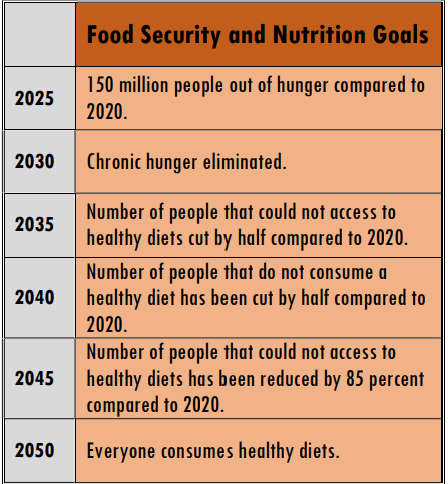
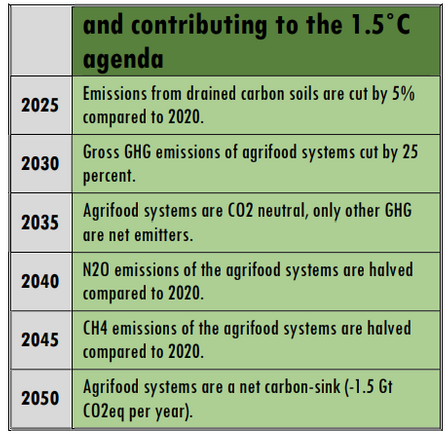
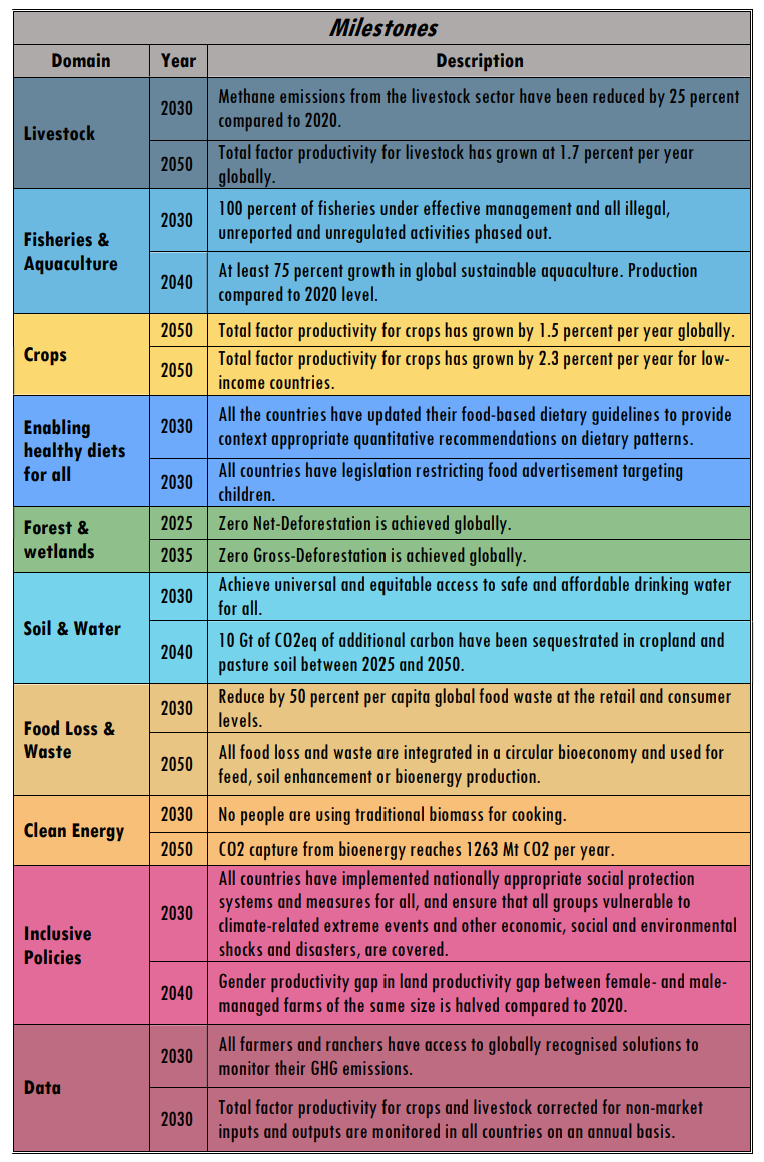
If there was one key takeaway from the report, it is that achieving these actions and the ultimate goals will require collaboration and investment, a theme that has endured throughout the whole of COP28.
Roll on 2024
As COP28 concludes in the warmest year on record, all eyes will be on the Bonn negotiations next June leading into COP29 which, it was confirmed this week, will be hosted by Azerbaijan.
The countdown to continue to build on and ensure progression is made following today's agreement in Dubai is on.


